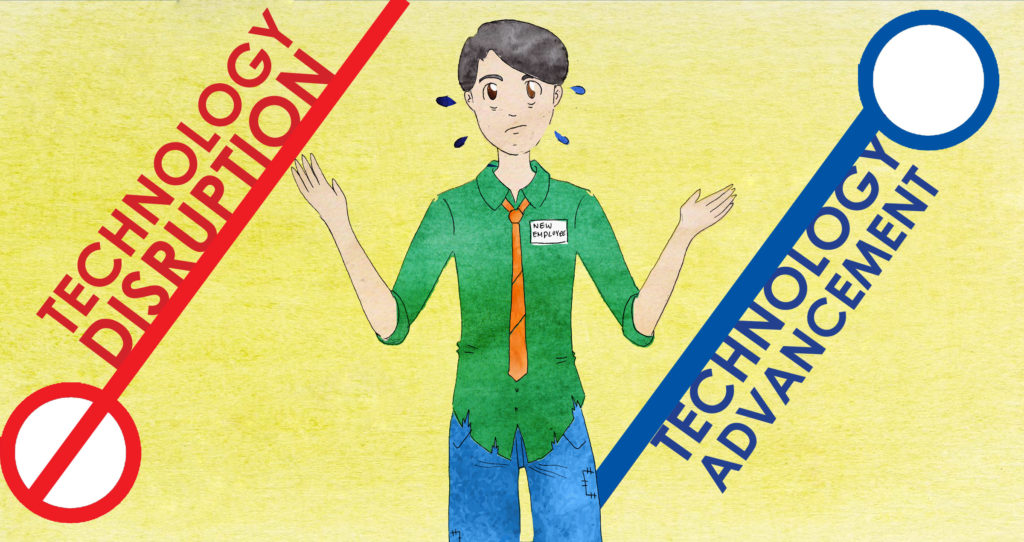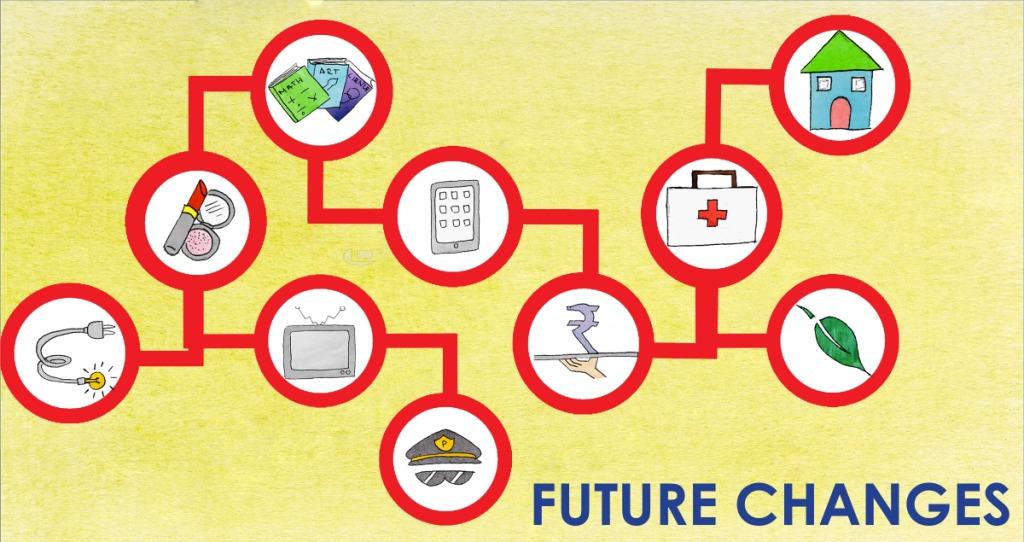As media works overtime to hype the issue of job losses in Indian IT, the reality is that writers of code are threatening their own jobs! Increased automation and use of tools make it easier and less labour intensive to create software. This is mirroring what is happening in a host of industries, whether manufacturing or services.
Every technology disruption has led to job losses, and destruction of entire industries or professions. But this time around, we appear to be in a veritable technology storm. Not one, but many (many!) technologies are supplementing and accelerating each other. (Some call it convergence?!)
Slowing job growth across the world, coupled with very visible job losses in retail, media, banking, manufacturing, and most traditional/mainstream industries has led to pessimism. After all, in future: cars will drive themselves; machines will print products; algorithms will trade shares; bots will service customers; software will conduct interviews; …
Naturally, people are scared. Wouldn’t you be?
Every technology disruption has led to job losses, and destruction of entire industries or professions.
Yet, I’m an eternal optimist – maybe a result of breathing the air blown from Vihar lake. I believe that more will get work – if they can do it!
It’s just that the nature of jobs will be completely different.
So what will these be, and why?
To answer that, let’s look at some of the mega-trends that are shaping not only employment but all of society…
Technology: Given the continuing evolution and explosion of technologies from phones to wearables to cars to IoT to drones to genomes to stem cells to analytics; demand for techies, scientists, researchers, and assorted geeks will continue. Of course, these people will need to be super-smart and highly qualified. [The zillions of engineers that India produces may not qualify. Hopefully, IIT-B grads will make the cut ].
Health services: Ageing is a reality in Japan, Europe, and even China. It will also happen in India and other less developed economies. Essentially the ratio of old (need care) to young (can give care) will worsen. Smaller (and nuclear) families, NRI kids and more women working mean that the aged will have to depend on external (non-family) support. So, expect robust demand for doctors, nurses, technicians, orthopedics, care-givers, and other health professionals. Home care services will see the highest growth (Don’t you hate going to a doctor/hospital?).
Wellness & Beauty: More and more people care about what they eat and how they look [After all, the selfie must be awesome!]. So more and more people will gym, run, trek, do yoga or qi gong, visit exotic spas, and consume a vast range of healthy, organic products. High achiever techies and management types will need help from stress. This will create huge opportunities for trainers, gurus, healers, yoga instructors, dietitians, beauticians, Baba Ramdevs, and such like.
Leisure, media and entertainment: If computers do more of our work, we will have more time to indulge. Expect more people to take holidays, eat out, go to concerts or events, and consume huge quantities of content across mediums. This will greatly expand opportunities for creative or sports people – filmmakers, musicians, editors, technicians and hangers-on, entertainers, artists and designers, people who teach music, sports, film, etc; sports administrators and coaches (think EPL or IPL), holiday organisers, and event managers. Don’t forget the people who serve you in restaurants, cook your food, and those who pour your drinks – machines are still far from taking their jobs!
Serving the Rich: Though we don’t always like the rich, their tribe will grow – especially in emerging markets. New opportunities will evolve for those who provide luxury services: interior designers, clothes designers, holiday organisers, wedding and party planners, and a whole bunch of advisors of various kinds – not least those who want to manage your money!

Security: Sadly, crime and terrorism will only increase. Every piece of negative news triggers more fear, and spend on security. The horrific attacks at the Taj Mumbai (26/11) resulted in mandatory screening/scans at all major hotels in India. Every terrorist attack in Europe has meant increased spend on security – people and technology. Demand for security personnel, devices and services will only grow, and grow.
Data Security & Analytics: The explosion of digital content has created enormous amounts of data that can be analysed for economic benefit (or plunder). On the flip side, hackers and online criminals are out to steal information or simply create chaos. Governments want to monitor what citizens are saying or doing. Corporations and countries will keep spying on each other. So those with analytics, data modeling, statistics, hacking, data security or forensics expertise will not lack opportunities.
Clean & Green: One of the nicer trends! The growing crisis with dirty lakes, rivers, cities, air, oceans, and forests will create a huge citizen backlash (already happening)! People with expertise in pollution control, clean energy, environment protection, organic farming, waste management, recycling, etc. will have plenty to do.
Home Services: Technology (IoT) might be able to figure out when your washing machine breaks down, or even if your faucet is leaking, but the computer cannot repair (yet!) all the stuff that needs fixing in the home. Rapid urbanisation is also driving growth of a greater variety of consumer durables and home stuff. Good news for people with (truly useful!) skills like carpenters, electricians, plumbers, AC repairers, fridge repairers, water filter cleaners, pest control gurus… or even a guy who cleans your water tank!. I’m sure you’ve got the picture!
Education: All these people providing all these wonderful services above will need to be better qualified. Good (and appropriate) education will become even more of a differentiator than it is today. Regardless of computer-aided tools; teachers, tutors, content creators, and school/college administrators will be in great demand. And not just in developing countries.
More and more of us will choose to work for ourselves, find customers and deliver services over the Internet.
Uberisation: Another big disruptor (and cutting across sectors) is what people describe as “Uberisation” or the “e-lance economy”. It’s not necessarily about what we do, but how? More and more of us will choose to work for ourselves, find customers and deliver services over the Internet. Millions of craftsmen, artisans, programmers, designers, writers, editors, musicians, photographers, analysts, taxi drivers (how could I forget!)… and many such skilled, creative professionals will no longer need to be employed. Traditional companies may find that their best employees prefer to be independent, and will have to re-think HR and recruitment. It’s not just the money, but flexibility and choice. This will benefit the highly talented across a range of services – both creative and technical.
The above list is not exhaustive. But the theme is clear – the human race (read consumers) will need less and less (as a %) of manufactured or farmed things – and more of things (services) delivered by humans. Fortunately, these are the very jobs (that need physical presence or specialised skills) that will be very hard to automate.
So I remain, the eternal optimist!
